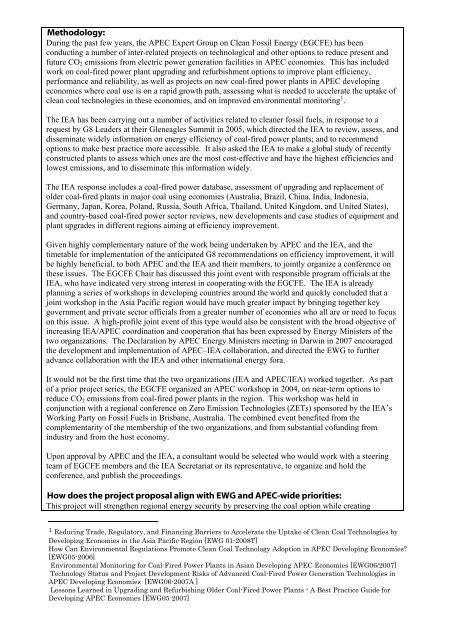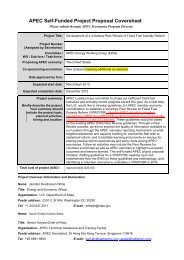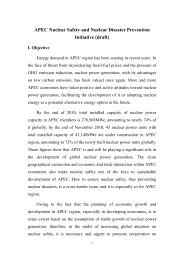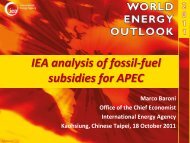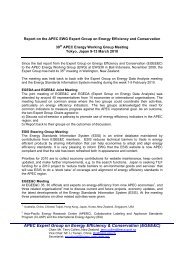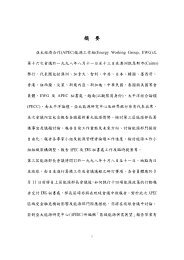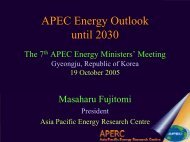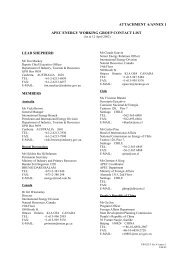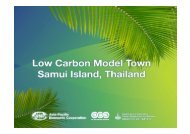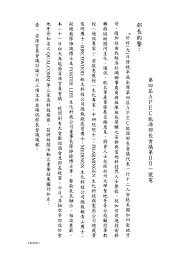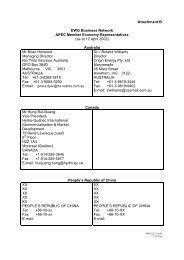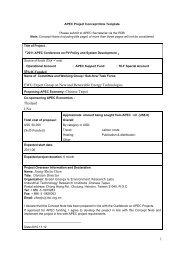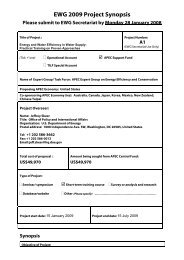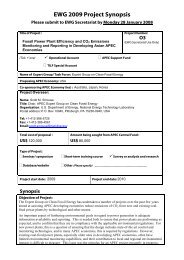EWG 2009 Project Synopsis
EWG 2009 Project Synopsis
EWG 2009 Project Synopsis
You also want an ePaper? Increase the reach of your titles
YUMPU automatically turns print PDFs into web optimized ePapers that Google loves.
Methodology:During the past few years, the APEC Expert Group on Clean Fossil Energy (EGCFE) has beenconducting a number of inter-related projects on technological and other options to reduce present andfuture CO 2 emissions from electric power generation facilities in APEC economies. This has includedwork on coal-fired power plant upgrading and refurbishment options to improve plant efficiency,performance and reliability, as well as projects on new coal-fired power plants in APEC developingeconomies where coal use is on a rapid growth path, assessing what is needed to accelerate the uptake ofclean coal technologies in these economies, and on improved environmental monitoring 1 .The IEA has been carrying out a number of activities related to cleaner fossil fuels, in response to arequest by G8 Leaders at their Gleneagles Summit in 2005, which directed the IEA to review, assess, anddisseminate widely information on energy efficiency of coal-fired power plants; and to recommendoptions to make best practice more accessible. It also asked the IEA to make a global study of recentlyconstructed plants to assess which ones are the most cost-effective and have the highest efficiencies andlowest emissions, and to disseminate this information widely.The IEA response includes a coal-fired power database, assessment of upgrading and replacement ofolder coal-fired plants in major coal using economies (Australia, Brazil, China, India, Indonesia,Germany, Japan, Korea, Poland, Russia, South Africa, Thailand, United Kingdom, and United States),and country-based coal-fired power sector reviews, new developments and case studies of equipment andplant upgrades in different regions aiming at efficiency improvement.Given highly complementary nature of the work being undertaken by APEC and the IEA, and thetimetable for implementation of the anticipated G8 recommendations on efficiency improvement, it willbe highly beneficial, to both APEC and the IEA and their members, to jointly organize a conference onthese issues. The EGCFE Chair has discussed this joint event with responsible program officials at theIEA, who have indicated very strong interest in cooperating with the EGCFE. The IEA is alreadyplanning a series of workshops in developing countries around the world and quickly concluded that ajoint workshop in the Asia Pacific region would have much greater impact by bringing together keygovernment and private sector officials from a greater number of economies who all are or need to focuson this issue. A high-profile joint event of this type would also be consistent with the broad objective ofincreasing IEA/APEC coordination and cooperation that has been expressed by Energy Ministers of thetwo organizations. The Declaration by APEC Energy Ministers meeting in Darwin in 2007 encouragedthe development and implementation of APEC–IEA collaboration, and directed the <strong>EWG</strong> to furtheradvance collaboration with the IEA and other international energy fora.It would not be the first time that the two organizations (IEA and APEC/IEA) worked together. As partof a prior project series, the EGCFE organized an APEC workshop in 2004, on near-term options toreduce CO 2 emissions from coal-fired power plants in the region. This workshop was held inconjunction with a regional conference on Zero Emission Technologies (ZETs) sponsored by the IEA’sWorking Party on Fossil Fuels in Brisbane, Australia. The combined event benefited from thecomplementarity of the membership of the two organizations, and from substantial cofunding fromindustry and from the host economy.Upon approval by APEC and the IEA, a consultant would be selected who would work with a steeringteam of EGCFE members and the IEA Secretariat or its representative, to organize and hold theconference, and publish the proceedings.How does the project proposal align with <strong>EWG</strong> and APEC-wide priorities:This project will strengthen regional energy security by preserving the coal option while creating1 Reducing Trade, Regulatory, and Financing Barriers to Accelerate the Uptake of Clean Coal Technologies byDeveloping Economies in the Asia Pacific Region [<strong>EWG</strong> 01-2008T]How Can Environmental Regulations Promote Clean Coal Technology Adoption in APEC Developing Economies?[<strong>EWG</strong>05-2006]Environmental Monitoring for Coal-Fired Power Plants in Asian Developing APEC Economies [<strong>EWG</strong>06/2007]Technology Status and <strong>Project</strong> Development Risks of Advanced Coal-Fired Power Generation Technologies inAPEC Developing Economies [<strong>EWG</strong>06-2007A ]Lessons Learned in Upgrading and Refurbishing Older Coal-Fired Power Plants - A Best Practice Guide forDeveloping APEC Economies [<strong>EWG</strong>05-2007]


